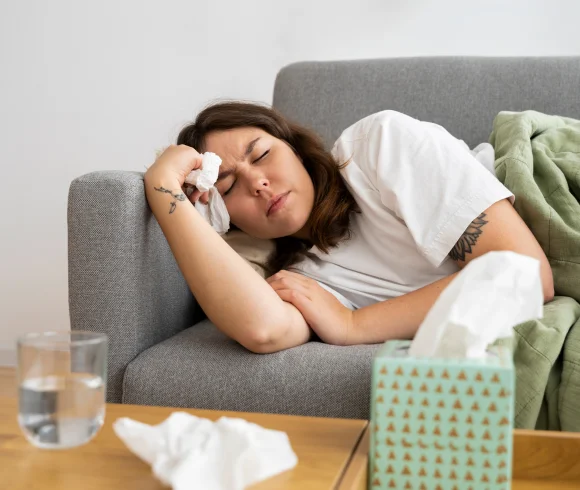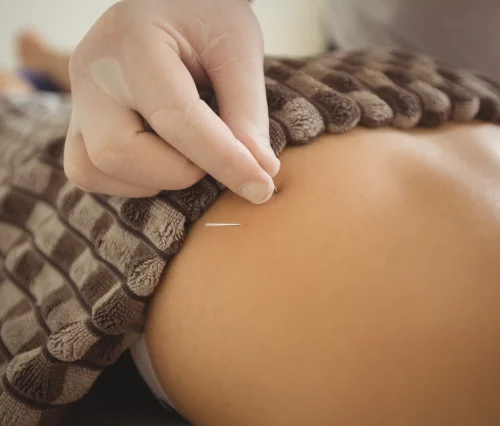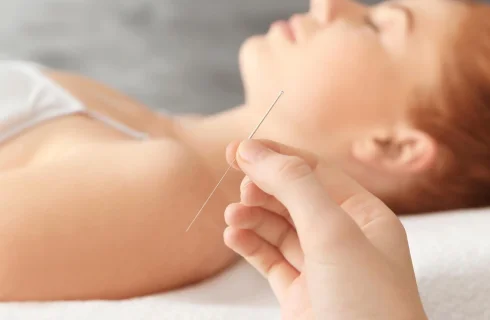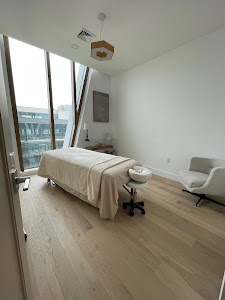Acupuncture for Allergies
Acupuncture for Allergies
What are Allergies?

Allergies are the body’s overzealous reactions to substances that are usually harmless, known as allergens. These can range from pollen and dust to certain foods and insect stings. One well-known type is seasonal allergies, triggered by pollen during specific times of the year, causing sneezing, congestion, and itchy eyes. These reactions occur when the immune system mistakenly identifies an allergen as a threat and produces antibodies, leading to symptoms.
In the quest for relief, many individuals seek natural approaches to manage allergies. Natural allergy relief methods often involve lifestyle adjustments, such as keeping windows closed during high pollen seasons and using air purifiers. Consuming local honey is thought to help build tolerance to pollen. However, it’s important to consult a healthcare professional for proper guidance and treatment, especially for severe allergies.
What are Allergy Symptoms?
- Sneezing and Runny Nose. Allergies often trigger frequent sneezing and a runny or stuffy nose, known as allergic rhinitis.
- Itchy, Watery Eyes. Eyes can become itchy, red, and watery due to the release of histamines in response to allergens.
- Skin Reactions. Allergic reactions might lead to skin issues like hives, itching, or eczema.
- Coughing and Wheezing. Allergies can exacerbate respiratory conditions, leading to coughing and wheezing, particularly in individuals with asthma.
- Fatigue. Allergic reactions can cause fatigue due to the immune system’s heightened activity.
- Headache. Some individuals experience headaches as a result of sinus congestion and pressure caused by allergies.
- Throat Irritation. An itchy or sore throat might accompany other allergy symptoms, especially during pollen-heavy seasons.
What Causes Allergies?
- Pollen. Pollen from trees, grasses, and weeds can lead to seasonal allergies, often referred to as hay fever.
- Dust Mites. Microscopic insects found in household dust can trigger allergic reactions, especially in bedding and upholstery.
- Pet Dander. Proteins in a pet’s skin cells, urine, and saliva can provoke allergic responses in sensitive individuals.
- Mold. Indoor and outdoor molds release spores that can cause allergic reactions, especially in humid environments.
- Certain Foods. Allergic reactions to foods like nuts, eggs, milk, and shellfish are common and can range from mild to severe.
- Insect Stings. Stings from bees, wasps, and other insects can trigger allergic reactions, sometimes leading to anaphylaxis.
- Medications. Some individuals might be allergic to certain medications, leading to adverse reactions.
- Latex. Latex allergy can occur in response to rubber products, causing skin irritation or more severe symptoms.
Acupuncture for Allergy Relief

Acupuncture, an ancient Chinese healing practice, has gained attention as a potential method for allergy relief. By targeting specific acupuncture points for allergies, this technique aims to rebalance the body’s energy flow, or Qi, and alleviate symptoms. Acupuncture for allergies often involves targeting points associated with the immune and respiratory systems, as well as those addressing stress and inflammation.
While some individuals report positive outcomes, scientific evidence on the effectiveness of acupuncture for allergies remains mixed. Some studies suggest that acupuncture might provide symptomatic relief, reducing nasal congestion and improving quality of life. However, more research is needed to establish its consistent benefits.
Treating Allergies with Acupuncture at Pulse Acupuncture
At Pulse Acupuncture Clinic, under the expertise of Marina Doktorman, allergies find a potential ally in the form of acupuncture. With a focus on holistic wellness, Marina targets specific acupuncture points to alleviate allergy symptoms. By harmonizing the body’s energy flow, her approach, which includes Bell’s Palsy acupuncture techniques, aims to reduce inflammation, ease congestion, and promote overall well-being. While individual responses vary, Marina’s skillful application of acupuncture for allergies offers a natural and personalized avenue for relief. Whether addressing allergies or conditions like Bell’s Palsy, it’s important to consider acupuncture alongside other treatments and consult with Marina or a qualified practitioner to determine its suitability for your specific management strategy.

-
Marina Doktorman, M.S., L.Ac., is an experienced acupuncturist who obtained her Masters of Acupuncture from the Tri-State College of Acupuncture in New York City in 2001. During her studies, she focused on Chinese Herbology, a branch of Traditional Chinese Medicine (TCM) that utilizes herbs to complement acupuncture treatments. Marina is licensed in both New York (NY) and New Jersey (NJ) and holds a Diplomate of Acupuncture from the National Certification Commission for Acupuncture and Oriental Medicine (NCCAOM), indicating her expertise in the field.
Why Pulse Acupuncture?

Experience
Marina Doktorman, L.Ac. has over 20 years of clinical experience.

RELAXATION
At Pulse Acupuncture, we aim to cultivate a spa-like environment.

Comfort
All of our needles are of the highest quality for painless insertion.
Patient Reviews in Brooklyn


I had the pleasure of working with Marina, Laryssa, and Jaesung, and they have all been absolutely amazing. Thanks to this incredible team, I can now sit, drive, walk, sleep comfortably, and function normally again. I truly don’t think I’d be where I am today without their care and expertise.
Pulse Acupuncture has become my go-to place for anything pain-related. The entire team is warm, compassionate, and professional, with outstanding bedside manners.
I highly recommend Pulse Acupuncture to anyone experiencing pain and looking for effective, non-invasive treatment. Truly life-changing! 😊











Marina is very accommodating, kind, and attentive, and her staff is a pleasure to deal with. I highly recommend Pulse.














Acupuncture has truly changed my life and has helped me in ways I didn’t even know were possible.
I started doing acupuncture to balance my hormones after 2 years of unsuccessful fertility treatments. When I started seeing Marina, my periods were starting to be regular and I was dealing with a few different symptoms which we started treating right away (constipation, random headaches, body aches)… in the last 3 years I have not been sick (no flu, have never tested positive for COVID) - Marina even treated me for allergies more than a year ago during an allergy episode in changing seasons.
Also want to mention Larissa as I started seeing her in Marina’s beautiful office and she’s also contributed to my wellness journey. Acupuncture is my favorite wellness practice, I see them regularly and have never felt better. I sometimes just tell them whatever I’m thinking/feeling knowing they will stick some needles in different places of my body and I come out floating and feeling so relaxed.




Excellent service- great results- highly recommended ~!





Marina is not only incredibly knowledgeable, but also very calming and has great bedside manners. If you're looking for a fantastic acupuncturist I can't recommend her enough!!













After 10 minutes of the procedure, you get into a different reality. Marina is knowledgeable, answers all the questions. After the procedure, the skin of the face glows, the body becomes lighter by a couple of pounds. I've been looking for such a procedure and state of mind for a long time.


I am beyond grateful to Marina, because after trying so many things, I almost lost hope. highly recommend Pulse Acupuncture and Marina for anyone seeking relief from pain or other health concerns.
The acupuncture sessions themselves are incredibly relaxing and therapeutic. Marina's gentle touch and precise needle placement always leave me feeling calm and rejuvenated. She also incorporates other techniques, such as cupping, which have been very beneficial for my overall health and wellbeing.
In addition to her skill as an acupuncturist, Marina is also a wonderful person to work with. She is warm, friendly, and genuinely cares about her clients' wellbeing. I always leave our sessions feeling refreshed and uplifted, both physically and mentally.
Overall, I highly recommend Pulse Acupuncture and Marina for anyone looking for high-quality acupuncture and personalized care. Thank you, Marina, for your exceptional service and dedication to helping others achieve optimal health!
Allergies Acupuncture - FAQ
How can acupuncture help with allergies?
Acupuncture can assist in managing allergies by:
- Modulating the Immune System: Acupuncture can help regulate the immune response, reducing overactivity which often leads to allergic reactions.
- Relieving Symptoms: Acupuncture can help alleviate common allergic symptoms like nasal congestion, runny nose, and itchy eyes.
- Reducing Inflammation: Acupuncture may help reduce inflammation often associated with allergic reactions.
How many acupuncture sessions are typically needed for allergies?
The number of sessions will vary based on the severity of the allergies and individual response to treatment. Some people might see improvements after a few sessions, while others may benefit from ongoing treatments, especially during allergy seasons.
Can I combine acupuncture with other allergy treatments?
Yes, many people combine acupuncture with other allergy treatments such as antihistamines, nasal sprays, and allergy shots. Always inform your acupuncturist about any other treatments or medications you’re using.
Are there any side effects of using acupuncture for allergies?
When conducted by a trained professional, acupuncture is generally safe. Some potential side effects include minor bruising, slight bleeding, or tenderness at the needle insertion sites.
How Does Acupuncture Compare to Other Natural Allergy Treatments Like Herbal Remedies?
Acupuncture and herbal remedies are both effective natural treatments for allergies, but they work in different ways. Acupuncture targets the body’s energy flow to restore balance and improve immune function, while herbal remedies aim to reduce inflammation, boost immunity, or treat specific symptoms. Some practitioners combine both approaches for optimal results.
Is Acupuncture a Long-term Solution for Seasonal Allergies?
Acupuncture may help provide long-term relief from seasonal allergies by supporting immune system function and reducing allergic reactions over time. Many people with seasonal allergies find that starting acupuncture treatment before allergy season begins can help lessen the severity of their symptoms and reduce the need for medications.
Contact us
Acupuncture therapy at Pulse Acupuncture Practice, at Clifton, NJ and Williamsburg, Brooklyn, NYC offers unique combination of various cupuncture types for healing on all levels: emotional, spiritual and physical by integrating ancient wisdom of energy healing with modern acupuncture techniques.


